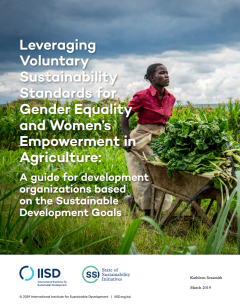
Gender equality and women’s empowerment in agriculture remain pressing challenges. Several barriers undermine women's contributions to economic, environmental, and social sustainability in their communities, including: food insecurity; unequal access to land, productive resources, and education; the gender division of unpaid care and domestic work; gender discrimination in access to decision making and empowerment; and insecure and precarious conditions of agricultural work for women.
This guidebook, which is a companion to the 2017 report Promoting Gender Equality in Foreign Agricultural Investments: Lessons from Voluntary Sustainability Standards, reviews the evidence of the contributions of voluntary sustainability standards (VSSs) to gender equality and women’s empowerment in agriculture, explains how VSSs can be used as a tool to meet related components of the Sustainable Development Goals (SDGs), and provides recommendations for development organisations.
The report highlights two ways that VSSs have the potential to contribute to gender equality and women’s empowerment: (i) the effectiveness of the standard at integrating gender into its certification criteria, and (ii) the outcomes from applying their design through specific activities and interventions by certifying bodies, producers as individuals and groups, and the organisations that work with and assist them. It then reviews each of these potential contributions for five VSSs, which were chosen based on their broad market coverage and effort to integrate gender criteria into their standards.
